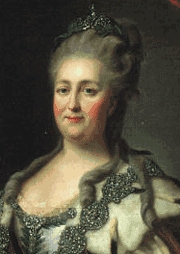January 1
Catherine the Great

On this date in 1729, Catherine II, the rationalist Empress of Russia, was born as Sophie Augusta Friederika in the province of Pomerania in Prussia. The daughter of the prince of Anhalt-Serbst, she was groomed at 14 to be the future wife of Peter, the disreputable heir to the Russian throne. Sophie moved to Moscow to be educated for her position. Her name changed to Catherine when she was received into the Russian Orthodox Church and married in 1745. She and colleagues, allegedly including her lover Orlov, deposed Peter III in a popular coup d’etat in 1762, when she assumed the throne at age 33 as Catherine II.
Catherine admired and corresponded with French rationalists such as Voltaire and Diderot, launched reforms, transformed St. Petersburg, wrote stories, and was a patron of the arts who helped to pave the way for the great 19th-century flowering of art, music and literature in Russia. She had an outsized need for affection and adulation, bonding with a dozen known lovers, but the more salacious myths about her were likely started by her political enemies.
Along with diplomatic methods, she used the military to violently expand her empire’s borders. More positively, she reformed the judiciary and governmental administration. She founded Russia’s first government funded library and women’s school, promoted a national education system and wrote a progressive legal code known as the Nakaz which, although never implemented, served as a widely respected and visionary template for future governments even beyond her borders.
Catherine responded to peasant revolts and the French Revolution with increasing conservatism and remained a Deist until her death at age 67 of a stroke. (D. 1796)
© Freedom From Religion Foundation. All rights reserved.“As Empress, Catherine endeavoured to enforce the enlightened humanitarian views of the great French Rationalists, with whom she was in complete sympathy. Her reforms, in regard to education, justice, sanitation, industry, etc., were of great value.”
— Joseph McCabe, "A Biographical Dictionary of Modern Rationalists"
